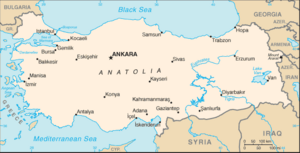Anatolia
|
|
Anatolia "rising of the sun" or "East"; compare "Orient" and "Levant", by popular etymology Turkish Anadolu to ana "mother" and dolu "filled"), also called by the Latin name of Asia Minor, is a region of Southwest Asia which corresponds today to the Asian portion of Turkey.
Anatolia_composite_NASA.png
Because of its strategic location at the intersection of Asia and Europe, Anatolia has been a cradle for several civilizations since prehistoric ages, with neolithic settlements such as Catal H? (pottery neolithic), [[Cay?] (Pre-Pottery Neolithic A to pottery Neolithic), Nevali Cori (PPN B), Hacilar (pottery neolithic), G?li Tepe (PPN A) and Mersin. The settlement of Troy starts in the Neolithic, but continues up into the Iron age.
Major civilizations and peoples that have settled in or conquered Anatolia include the Hattians, Luwians, Hittites, Phrygians, Cimmerians, Lydians, Persians, Celts, Tabals, Meshechs, Greeks, Pelasgians, Armenians, Romans, Goths, Kurds, Byzantines, Seljuk Turks and Ottomans. These peoples belonged to many varied ethnic and linguistic traditions. Through recorded history, Anatolians have spoken both Indo-European and Semitic languages, as well as many languages of uncertain affiliation. In fact, given the antiquity of the Indo-European Hittite and Luwian languages, some scholars have proposed Anatolia as the hypothetical center from which the Indo-European languages have radiated. Other authors have proposed an Anatolian origin for the Etruscans of ancient Italy.

Today the inhabitants of Anatolia are mostly native speakers of the Turkish language, which was introduced with the conquest of Anatolia by Turkic peoples and the rise of the Ottoman Empire in the 13th century. However, Anatolia remained multi-ethnic until the early 20th century (see Young Turks). A significant Kurdish ethnic and linguistic minority still exists in the southern regions.
